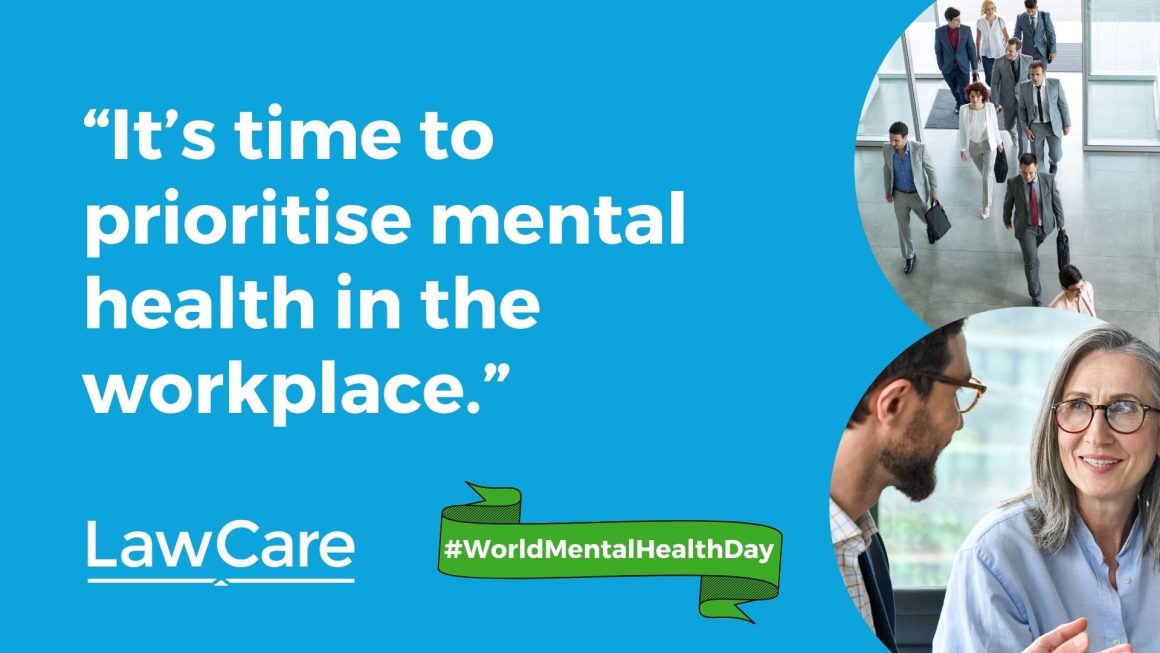This World Mental Health Day (10 October), LawCare, the charity that promotes and supports better mental health in the legal sector, is sharing practical tips to help you create a mentally healthy workplace. They’re also offering a free webinar to give legal professionals the tools they need to manage work challenges and prioritise mental health at work.
Free LawCare webinar in October
- How workplace culture and practices affect mental health in legal sector support roles webinar (Thursday 10 October) – LawCare’s second webinar will look at how workplace culture affects the mental health of those in legal support roles (business services, admin, HR, IT, finance, knowledge/professional support, and risk and compliance roles). Adam from Pembury Legal will lead the session, which will provide practical tips for improving wellbeing at work. Sign up here: https://lawcare.beaconforms.com/form/e361d66b
Creating mentally healthy workplaces
At LawCare, the charity that promotes and supports better mental health in the legal sector, we’ve heard from thousands of people about their stress, anxiety, and depression, often caused or exacerbated by a difficult working environment. Common issues include a lack of support or supervision, overly critical managers, being undermined after a career break, having an overwhelming workload, long hours, and sleep deprivation.
Firms and legal workplaces need to create an environment where positive mental health is actively prioritised, not only because it is the right thing to do, but because there is a strong proven business case for it. A healthy workplace culture leads to greater productivity, better morale, better retention of valued and experienced staff, reduced sickness absence, a better service for clients and mitigates compliance risks
Here’s our tips for creating a mentally healthy workplace:
Invest in good people management
- Good line management can help manage and prevent work related mental health concerns and spot concerns early.
- Train and resource those that manage others with the skills they need to do this well.
- Ensure managers have the capacity to manage others and can act promptly on any concerns raised, this may mean limiting or reducing their fee earning responsibilities.
- Monitor the wellbeing of your staff, consider anonymous surveys; respond to any issues these raise.
- Be mindful of staff working in areas which can be emotionally difficult. They may need additional professional support, the opportunity to share their experiences, or advice on techniques for coping.
Foster work/life balance
- Having the time to pursue the things we enjoy and spending time with friends and family is vital to wellbeing. Encourage everyone to work sensible hours – staff will take cues from how leaders behave. Take full lunch breaks; rest and recuperate after busy periods; avoid working at weekends; take annual leave entitlement. Make sure teams are well resourced to make this happen.
- Flexible working can support healthier and more productive ways of working for all staff and lead to increased morale, commitment, productivity and reduced sickness absence.
- Have a sensible email policy in place for the sending and receiving of emails outside core working hours.
Support psychological safety and open communication
Encourage open dialogue at all levels within your organisation about mental health, sharing stories and lived experience can help break down stigma and stereotypes.
Fostering a workplace culture where people feel comfortable to speak up about concerns without fear of judgement or retaliation is essential.
- Encourage colleagues to treat each other with respect, say hello, say thank you, not raise their voice or threaten each other. Make sure there are clear and effective systems in place for reporting and addressing bullying, harassment or sexual harassment.
Mentoring and peer support
- Peer support can allow colleagues to support one another outside the line-management structure.
- Mentoring and buddy schemes can help new staff to understand your firm faster and can support all staff to gain confidence and develop new skills.
- Ensure that colleagues feel able to admit any mistakes they have made.
- Reverse mentoring – pairing a junior member of staff with a senior leader in the organisation – can be very effective. There will be a new reverse mentoring toolkit available from LawCare early in 2025.
By focusing on mental health, we can create workplaces that are more supportive, understanding, and productive. This World Mental Health Day let’s commit to creating a healthier work environment for everyone.
Further information
LawCare also provides a free confidential helpline, email and live webchat for all branches of the legal profession, along with peer support, training, talks, and other resources. Contact LawCare on 0800 279 6888, email support@lawcare.org.uk or visit www.lawcare.org.uk.
 Elizabeth Rimmer
Elizabeth Rimmer